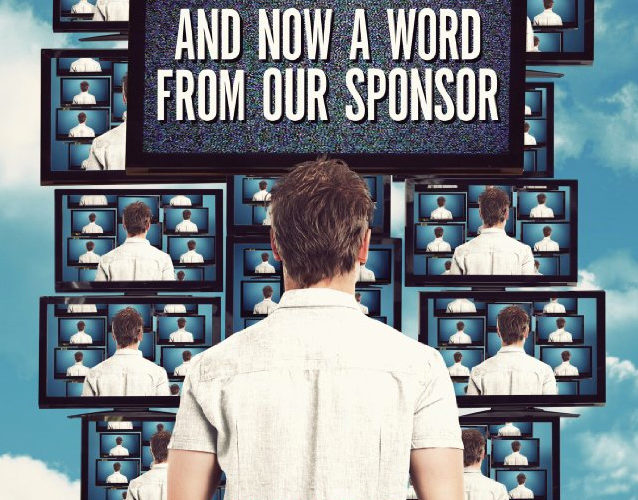Points for ingenuity to screenwriter Michael Hamilton-Wright for crafting a feature length script that makes sense around a character only speaking in commercial slogans. Sadly, though, And Now a Word from Our Sponsor possesses little else besides this gimmick. The publicity description overreaches in its comparison to Peter Sellers’ brilliant Being There, somewhat missing the point of the classic. While Bruce Greenwood’s Adan Kundle does find himself fatefully assisting in the reconciliation of his caretakers’ familial strife, his accidental profundity isn’t the incoherent ramblings of a simple man. No, Adan understands everything happening around him and seems to merely choose this form of conversational discourse because the advertisements in his head are all he has left. His words paired with an expressive delivery are spoken deliberately with a full grasp of their interpretive powers.

This is marketing after all. Guys like Kundle and his firm’s president Lucas Foster (Callum Blue) are successful because they can manipulate the public into feeling a joyful desire for their client’s product in the span of a semi-attentive thirty seconds. They spin words and create fantasies to turn things we don’t need into something we cannot live without. So while Adan’s phrases initially appear cute and goofy, it isn’t long before we realize they aren’t as abstract as those quick to label him crazy believe. Hamilton-Wright and director Zack Bernbaum attempt to to retain the aura of a higher power at work, but the utterance of “Got milk?” when presented a dry bowl of cereal makes it impossible to accept his responses as anything more than from a stubborn man wholly engaged in some convoluted exercise.
Greenwood is too good at expressing more than his words convey. We see the struggle of finding the perfect slogan when Karen Hillridge (Parker Posey)—the woman who takes him in until a placement at a long-term care facility opens up—questions his process and half-heartedly tries to put an end to it. His eyes speak volumes and shatter all comparison to Sellers’ deadpan delivery of words spoken from within that earn meaning through those listening. Adan conversely knows how to twist these taglines so he may be understood. There is no spiritual entity guiding him so he may help Karen and her daughter Meghan (Allie MacDonald) bury whatever hatchet has torn their relationship to shreds. He’s just a man with a condition that is surprisingly still quite capable of living autonomously while afflicted.

Unfortunately, this realization makes audiences want to know what’s actually happening. We learn from the self-centered and greedy Lucas that Adan vanished a year previously only to now return unconscious in front of an electronic store’s television display. This coupled with an immensely strange sequence of Kundle getting sucked into Karen’s TV pretty bluntly knocks us over the head with the clumsily constructed impossibility he was living inside commercials for the duration. Rather than run with the concept, however, the filmmakers ignore the incident altogether until a too cute for its own good ending while also rendering it moot if we interpret him as just a man who lost his vocabulary. The idea he’s some kind of angel clashes with the one where he’s still plain Adan and the whole enterprise is meaningless as a result.
And then there’s the superfluity involved with the villain of the tale—Blue’s Lucas—being utterly flat in the context of Adan’s journey and young Meghan Hillridge’s rebellious nature doing nothing but introducing the stereotypical boyfriend Jason (Rhys Ward) to provide the clichéd opening needed for her to let Kundle in. Blue’s jerk is mean to his secretary Jenny (Allison Dawn Doiron) and wants the company all to himself despite angering clients and making bad decisions along the way. He plays those around him, proves the antithesis of Adan, and desires only self-satisfaction despite somehow getting redeemed by the end. The same goes for Meghan whose vicious verbal abuse seems disproportionate to the reason she’s distanced herself from Karen and Jenny who alternates between hating Lucas and being just as bad.

Perhaps Hamilton-Wright bit off more than he could chew making sure his central character’s dialogue worked because the others inhabiting the story suffer greatly from two-dimensionality. Posey’s Karen is fun as the straightman providing understanding and compassion while Blue overplays his smarm effectively for some laughs, but neither become more than props for Adan to project his eccentricity onto. It’s frustrating to see potential wasted as resolutions begin to fall into place so easily that you wonder what the point was. The arbitrariness of everything is hard to overlook and any desire for profound satire showing how slogans have become part of everyday lexicon forcing us into doing things we wouldn’t on our own is strained at best.
And Now a Word from Our Sponsor has one thing going for it—Greenwood’s performance. Whether flapping his unkempt hair in confusion, dispensing an entire Chevrolet ad in one take (with a hilarious alternate version during the end credits), or adding well-timed taglines to infuse much needed wit in a scene, it’s comedy gold of which the actor obvious had fun playing. And while the film itself leaves plenty to be desired, Greenwood’s Adan and his encyclopedic collection of ad verbiage simply won’t let me give it as low a score as many viewers probably will after dismissing it as trite nonsense. The concept may be more trite than profound, but it isn’t without a few laughs amongst its inventive flair. For that I’m glad to have watched.
And Now a Word from Our Sponsor hits limited release on Friday, May 10th.

